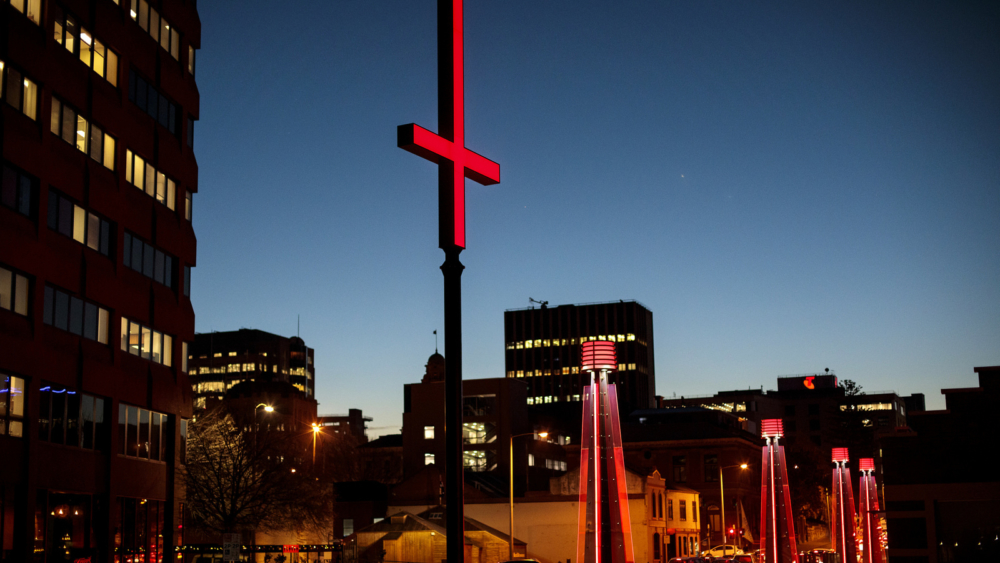Inverted crosses stir up fevered debate
Christians split on how to respond to the irreverent symbols of the Dark Mofo arts festival
Some Christians have been offended by the erection of several large inverted crosses in prominent positions around the Hobart waterfront as part of the Dark Mofo arts festival, which opens tonight.
The 20-metre high bright red crosses – known as the Cross of St Peter – highlight the occult themes of the midwinter festival, which runs until June 24. The programme delves into centuries-old pagan solstice rituals, exploring links between ancient and contemporary mythology, humans and nature, religious and secular traditions, darkness and light, and birth, death and renewal. It includes film and performances tagged Dark + Dangerous Thoughts and a concert by English doom metal band Electric Wizard called “Lucifer, I summon thee to my black mass.”
The occult themes of Dark Mofo worry Mark Brown, Tasmanian director of the Australian Christian Lobby, who called on Christians to protest against the crosses, which he said were “highly offensive” and dangerous because “we’re dealing with spiritual forces here.”
However, Mike Lynch, campus director of the Fellowship of Christians at the University of Tasmania, told Eternity he believed the festival was an exercise in artistic playfulness with irreverent ideas rather than any spiritual engagement with pagan forces.
“It’s very much an experimental fringe festival approach and in that sense it’s similar to what heavy metal has done for years,” he said.
“It’s often not claiming to be anything sincere in terms of religious belief but rather using them forms and ideas as playthings.
“When they feel that things that are precious to them are being mocked or flouted, they feel hurt or distressed.” – Mike Lynch
“I think it would be a very small subset of those involved in the Mofo festival that would, in any sense, have a devout or religious or spiritual engagement with these ideas. They’re much more metaphors and artistic tools.”
Lynch did, however, express sympathy with Christians who were offended by the crosses.
“Symbols and ideas matter to people and so when they feel that things that are precious to them are being mocked or flouted, they feel hurt or distressed,” he said.
“Do we really want to celebrate a hopeless and nihilistic view of death?” – Mike Lynch
He said he could understand how seeing the bright red inverted crosses while driving around Hobart could create bleak or oppressive feelings, especially when seen in the context of the larger public statements by Mona – the Museum of Old and New Art, which stages the Dark Mofo Festival – and its founder, David Walsh.
“It’s a museum of sex and death, as they call it, but it’s not very sexy and it’s not at all hopeful – it’s a very grim, very animal view of sex and death. And I think it’s right to be distressed about that. Do we really want to celebrate a hopeless and nihilistic view of death?”
“What would it look like for us to try and make things that are good and true and beautiful that excite people’s imagination?” – Nathan Campbell
Brisbane-based Presbyterian minister Nathan Campbell said Tasmanian Christians should use the crosses as a great opportunity to talk to people about the gospel.
“The other thing we could be doing is looking at the power of art. I question why we have abandoned that field. We only make art for Christians, not art for the world, so if there’s a festival of darkness in Hobart, where is our equivalent festival of light? And what would it look like for us to try and make things that are good and true and beautiful that excite people’s imagination?”
In a statement, Dark Mofo said the festival had been exploring ancient mythology and religious themes since its inception in 2013.
“The cross is a powerful and deeply significant historical symbol, that has been used for thousands of years, with many diverse cultural meanings,” it said.
“For many, the symbol evokes an emotional response for reasons that we don’t fully understand.
“While we respect and understand different interpretations, we cannot be responsible for attitudes that people bring to the festival.”
Email This Story
Why not send this to a friend?


